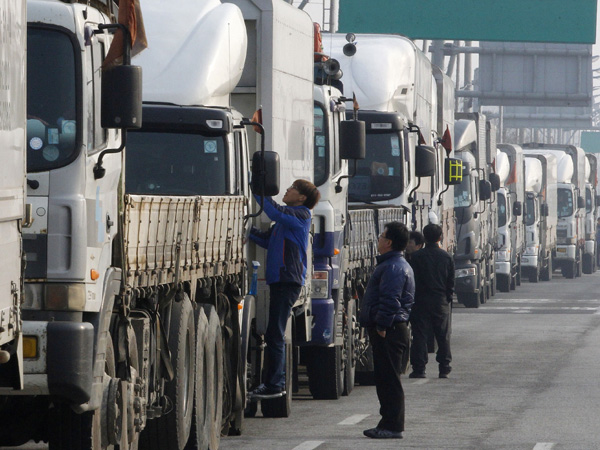Isolated S. Koreans tough it out as crisis grows

South Korean truck drivers wait to head for the North Korea’s city of Kaesong, at the customs, immigration and quarantine office in Paju, South Korea, near the border village of Panmunjom, Thursday, April 4, 2013. AP
Paju, South Korea – Fear and anxiety are spreading among hundreds of South Korean workers sitting 10 kilometres inside North Korea and trying to ride out a growing military crisis that is edging ever closer.
The Kaesong joint industrial area, the last remaining symbol of inter-Korean cooperation, has become a pawn in an increasingly dangerous, high-stakes game of brinkmanship between Pyongyang, Seoul and Washington.
A day after it blocked South Koreans from accessing the complex, Pyongyang on Thursday threatened to pull out the 53,000 North Korean workers who keep the South Korean factories in Kaesong running, and to shut it down entirely.
Although allowed to leave Kaesong, some 800 South Korean managers and staff have opted to stick it out for now, as dire threats of nuclear war and retaliation fly back and forth over their heads.
“The anxiety is really ramping up,” said Kwon Sook-Mi, who decided to leave the mobile phone plant in Kaesong where she works and cross back into South Korea on Thursday morning.
“There’s a lot of uncertainty and some people are finding it mentally very tough,” Kwon, 37, told AFP.
By contrast, Kwon said she had seen “no particular change” in the attitude of the North Korean workers at her plant since the crisis began.
Kim Won-Soo, the manager of a footwear plant, said his company was running out of supplies, both for the assembly lines and employees.
“We’ll have to stop operating soon as we’re almost out of raw materials,” said Kim, who crossed back to the South with another group in the afternoon.
“Food supplies are also low, and stocks in the local supermarkets are way down. It’s going to be noodles from tomorrow,” he added.
On the South Korean side of the border crossing near Paju city, around 100 people and 40 trucks turned up early in the hope of the access ban being lifted on Thursday.
Drivers, managers and workers huddled in small groups, discussing the situation, with much of the talk focused on how long the 123 South Korean companies in Kaesong can keep going.
“Time is going to run out very fast,” said Ryu Koon-Sung, who works for a female underwear company, Young Inner Foam, in Kaesong.
“If I can’t get the material packed in this truck over, then we’re going to have to stop production in a few days,” Ryu said.
At 8:30 am, the expected announcement was broadcast over loudspeakers: “Entry into Kaesong is impossible today”. The trucks began turning away, although some drove straight to an adjacent car park to try again on Friday.
“Kaesong should not become a scapegoat for political games,” Ryu said, shaking his head.
South Koreans in general have grown accustomed to the North’s threats and provocations over the years.
Even now, there is some anxiety but little panic — in contrast to 1994, when a North Korean negotiator threatened to turn Seoul into “a sea of fire” and people stripped store shelves and bunkered down.
These days Seoulites, especially the young, largely shrug off such threats and the bars and clubs of the upscale Gangnam district remain as popular as ever.
The stock market is also remarkably resilient, down barely 1.0 percent since the war rhetoric intensified two weeks ago.
In the Customs, Immigration and Quarantine hall of the Paju border crossing, a slightly desperate Han Jae-Kwon, head of the association that represents the companies in Kaesong, urged an end to the impasse.
“Operations in the complex are in serious trouble because of North Korea’s ban… and there is fear and apprehension that the complex could be shut down permanently,” Han said.
Han spoke in front of a banner reading: “We appeal for normalisation of passage to Kaesong” — a simple, plaintive message compared to the bellicose rhetoric emanating from Pyongyang.
Han said production had already ceased at a few smaller plants and others would run out of food within a week, as well as gas for heating and cooking.
Kim Deok-Chul, who was trying to cross into Kaesong to reach his textile company, said the complex risked losing its special status as a haven of cooperation that has always weathered political storms.
“Kaesong is a place where people from both side communicate,” Kim said. “Both sides should make concessions and keep this area as it is.”














